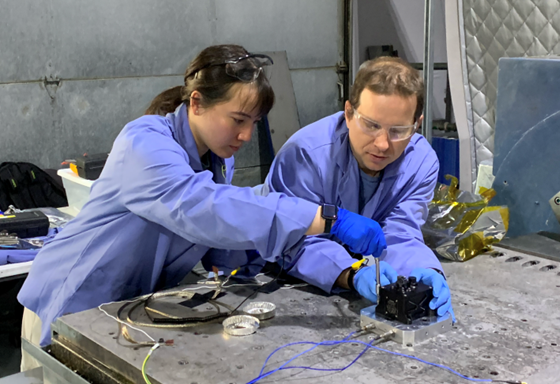NAU/NASA Space Grant Office
NAU/NASA Space Grant
Fellowship Program
-
Fellowship Program Information Tab Open
-
Application, Selection and Important Dates Tab Closed
-
Mentor and Student Application Links Tab Closed
Fellowship Program Information Accordion Open
About Our Fellowship Program
The NAU NASA Space Grant Fellowship Program currently provides 2 graduate fellowships to graduate students pursuing STEM graduate degrees at Northern Arizona University. The goals of the Fellowship Program are to encourage individuals to pursue graduate education in a STEM field, and to support NASA-related research happening at the University.
Award
NAU competitively awards graduate fellowships. Each graduate fellow is expected to support several, if not all, NASA Mission Directorates. Awards include 1) A total stipend of $7,500 paid, estimated at 10 hours of work per week over the academic year (Fall/Spring/Summer). The NAU Graduate Fellowship is geared to address AZSGC NIF goals/SMART Objectives, NASA Strategic Priorities and Objectives, and align with NASA Mission Directorates (MDs). Mentors and graduate students in the Department of Astronomy and Planetary Science can apply competitively with a project proposal aligned with NASA MDs and work collaboratively during the academic year, ultimately presenting their work at the NAU Graduate Student Government (GSG) poster symposium and at the NAU Department of Astronomy and Planetary Science Spring series colloquium event. NAU estimates that research mentor will provide cost-share for their interns’ wage and student benefits.
Eligibility
The NAU/NASA Space Grant Graduate Fellowship program is open to graduate students who meet the following criteria:
- U.S. citizen per NASA (federal) funding guidelines
- Enrolled as a full-time graduate student at Northern Arizona University during the Fall and Spring semesters of the award year. The awardee cannot graduate before May of the award period. Full time enrollment as defined by the NAU Graduate College as 9+ credit hours.
- Pursuing an advanced degree program of study in a STEM field. As long as the applicant is working towards a STEM degree, they are eligible to apply. As described in the Space Grant Act of 1988, the Space Grant Program supports any academic discipline or field of study that will improve the understanding, assessment, development, and utilization of space. This includes physical, natural, and biological sciences, and engineering, space technology, education, economics, sociology, communications, planning, law, international affairs, and public administration.
- Receives support/commitment from their department to meet the cost-share requirements for this award, including at least $6,000 as a stipend or TA/RA/GA wages and in-state tuition coverage.
Duration
Graduate fellowships are academic year-long awards. Fellows may apply for a second year of funding with sufficient evidence of effort exerted towards meeting their goals in the first year of the award. Fellows should clearly showcase the knowledge and skills they learned in Year 1 and how that will aid them in expanding their science communication and outreach efforts in Year 2 of the award.
Application, Selection and Important Dates Accordion Closed
Application Requirements
The online application form should be submitted no later than the due date found under Important Dates and Deadlines. Applicants will be notified of awards by early May and must accept the award by the given deadline.
Selection Process
The NAU/NASA Space Grant Steering Committee will select graduate fellow(s) based on academic qualifications and the strength of their overall application.
Important Dates and Deadlines
- Application Opens: February 13
- Deadline: March 11
- Award Selections: By late April
- Duration of Award: August – April (Fall/Spring Semester)
Program Completion Requirements
The NAU NASA Space Grant Fellowship Program is intended to support and retain outstanding graduate students pursuing STEM degrees. Space Grant Fellowships are competitively awarded and recognize students for their high achievements and academic merit. This includes their ability to communicate and present scientific research to the public, an important skill in sharing NASA’s research with our community. Our fellowship provides both Research and Outreach components.

